Intuitive Eating for Beginners
- February 12, 2018
- Last Updated: January 31, 2025
- 11 Comments
- Intuitive Eating
How do you start intuitive eating for beginners? Use these 5 tips to start transforming your relationship today!
There’s been big news about the recent announcement that Weight Watchers will offer free 6-week membership programs to kids as young as 13.
There’s a lot of uproar in the anti-diet nutrition world, for good reason. Diets don’t work – plain and simple.
So, what does it mean to be healthy?
If you want a great introduction to intuitive eating and why it’s the exact opposite of dieting, check out my Ebook about simplifying intuitive eating.
Grab Our Meal Prep Ebook to Finally Conquer Meal Prep in the Kitchen
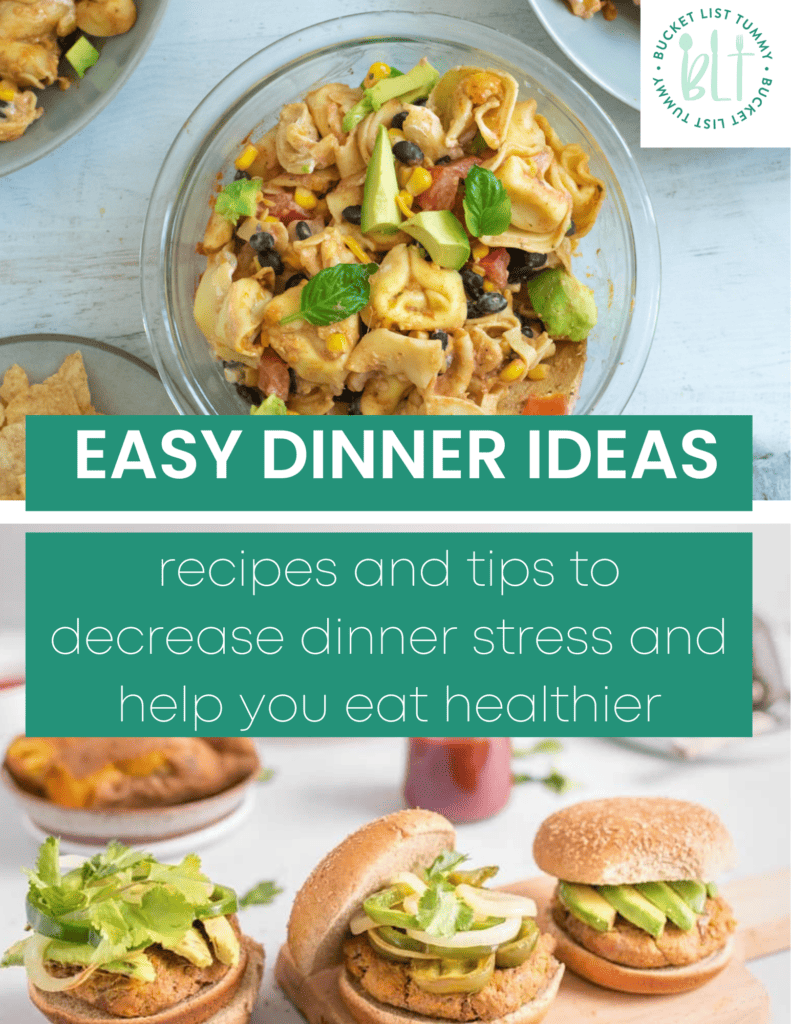
How to Start Intuitive Eating
More and more of my clients come in having heard of Intuitive Eating, which is a win. Yay for awareness!
However, they don’t quite understand how to start it. Intuitive eating for beginners can be hard, and confusing, and scary.
Certainly, the beginning of intuitive eating, especially if you’re coming from a diet mentality, can be difficult.
People commonly say, “I can eat anything I want? I feel like I’ll just go crazy,” or “I won’t eat anything [healthy]”.
“If I ate all of my food cravings, I’d be in trouble!”
I’ve heard it all. And I get it – it’s a whole new way of thinking/eating.

Intuitive Eating for Beginners Tips
But, sorry to break it to you guys, you don’t just become an intuitive eater overnight.
In fact, you never really achieve perfect intuitive eating, because that doesn’t exist.
It’s a continual process that you engage in, where you are constantly learning more about yourself, your wants/needs and your habits.
You’re checking in and giving your body what it needs. These intuitive eating books are great for helping educate you.
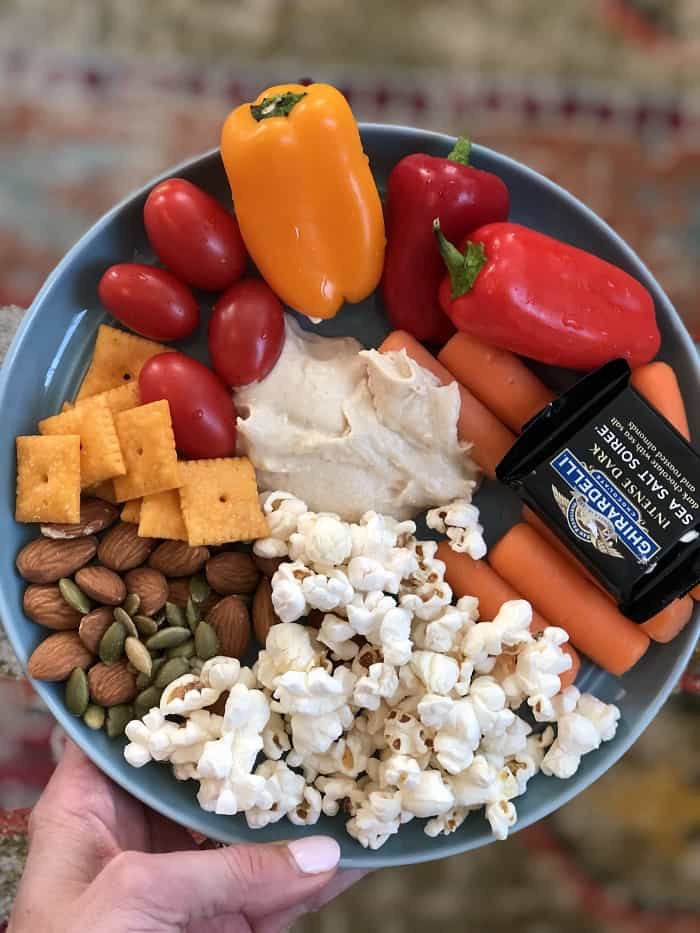
But since we’re fluid human beings and our needs are always changing, we never really achieve the end of intuitive eating, if that makes sense.
The practice is based on ten principles of intuitive eating and has actually been around since the 1990s, though it has recently seen a spike in popularity.
Here are some tips for intuitive eating for beginners. I hope this can help you gradually work some principles of intuitive eating into your day.
1. Be Spontaneous
Do you wake up and head to make the same thing for breakfast every morning, without even thinking about it?
I know sometimes I’m on auto-pilot and just head to the fridge to heat up some steelcut baked oatmeal or make a quick creamsicle smoothie.
But, what if I really wanted something heavier, lighter…or just something different?

Meal routines can be a good thing, but a pre-packed and predetermined lunch may not be what you want one day.
Are you used to packing a sandwich for lunch every day?
Try taking yourself out spur of the moment and order what you really want. It can be freeing (and challenging) to decide what you truly want to eat in the moment.

2. Tune In To How Certain Foods Make You Feel
Maybe you’ve noticed a pattern of going to bed overly full and not waking up hungry.
Perhaps you try a night without snacking after dinner?
Or, maybe it’s the complete opposite and you wake up in the middle of the night hungry, or can’t wait for breakfast the next morning. You may need a bigger dinner or a bed-time snack.
Check in with your body – how are you feeling? What does hunger feel like? What do you need?
Are you too busy to pack or eat an afternoon snack?
That afternoon snack may give you that burst of energy you need to finish the day, so ignoring that afternoon hunger cue isn’t doing you any favors.
Food has the ability to energize us. Try to eat more of the foods that make you feel good.

3. Have Trust In Yourself
Are you too nervous to include your beloved pizza in your food routine out of fear that you’ll start eating it all the time? Just try adding it in once.
If you find yourself craving pizza the following day, have it again. And again the following day.
I’d bet that after a week, you won’t be craving it anymore.
Learning to trust yourself and your food choices is part of the process of tuning in to your body.
If you don’t add in your “fear” foods, you will keep fearing them.
Note: I wholeheartedly recommend working with a professional when doing this.


4. Feel Your Feelings (Without Food)
I’m not talking about the term emotional eating here (check out the distinction on emotional hunger vs. physical hunger.)
In many ways, eating is emotional–so it’s nearly impossible to fully separate your food from your feelings.
However, it’s necessary to have other coping strategies for feelings like loneliness, boredom, anxiety and sadness.
What other outlets can you utilize?

Realizing that food won’t solve these feelings and finding other ways to distract or nurture yourself will play an important part in your relationship with food–and with yourself.
5. Ask Yourself What Satisfaction Feels Like
While eating a lot of vegetables may fill you up, will they leave you satisfied if the meal you actually wanted was a sandwich?
Eating should be both a pleasurable and satisfying experience. When you eat what you truly want in an enjoyable environment, you are more likely to feel full and satisfied.
You may even find that it takes less food than you originally thought to reach that satisfaction level.
Your body will be in tune with satisfaction and fullness when you are in tune with your body.

If you’re wanting to incorporate more intuitive eating principles into your life, I would very much recommend getting this workbook.
I use it with clients because it offers tangible exercises to do. Intuitive eating isn’t all or nothing.
It is something that we are constantly practicing and working toward, because no one is a perfect intuitive eater all the time.
But that’s the great part – you take all expectations of perfection off the table, which can be so freeing in and of itself.
Want More Intuitive Eating Resources? Check Out My Ebook on How To Become a Normal Eater
Explore More Recipes
Intuitive EatingSupport Bucket List Tummy

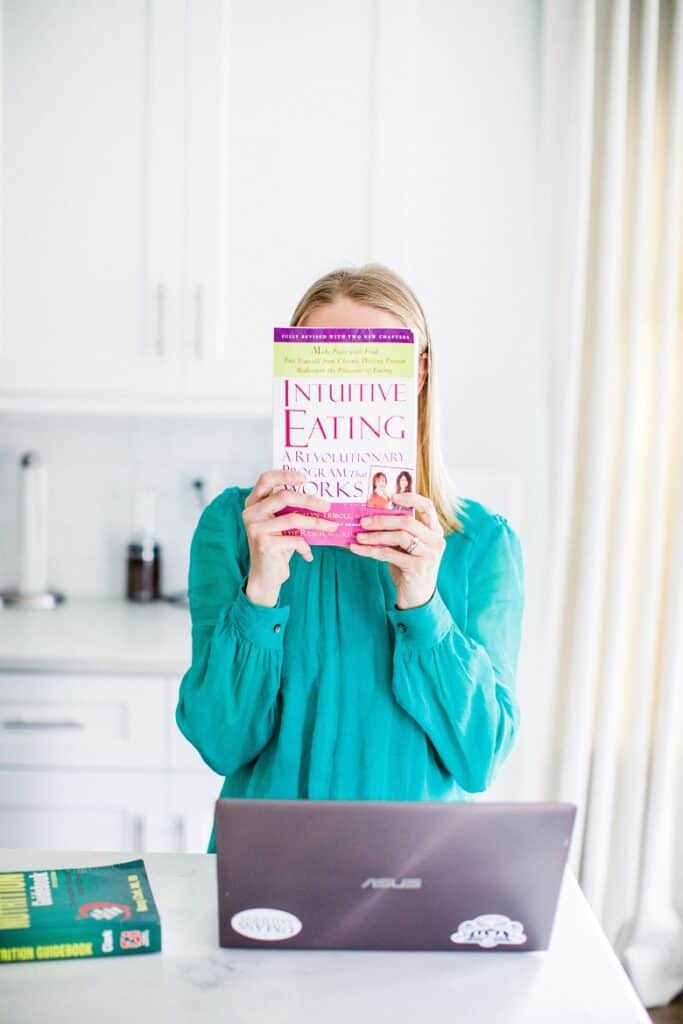


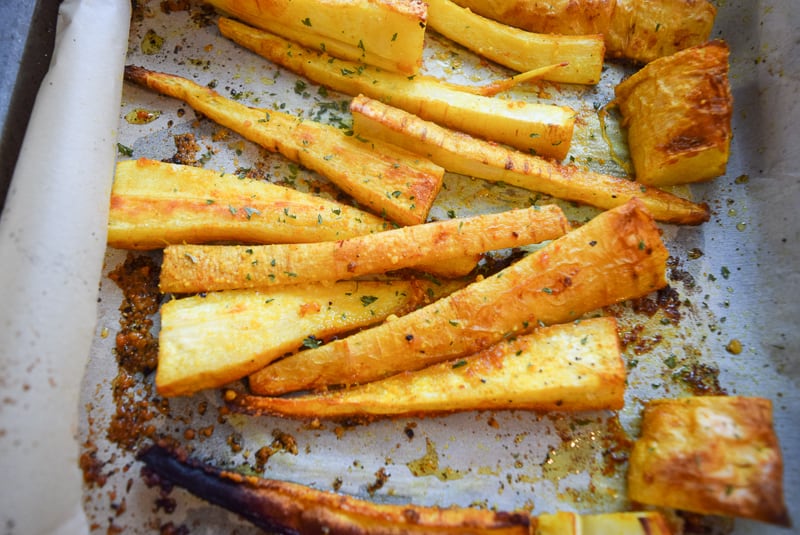
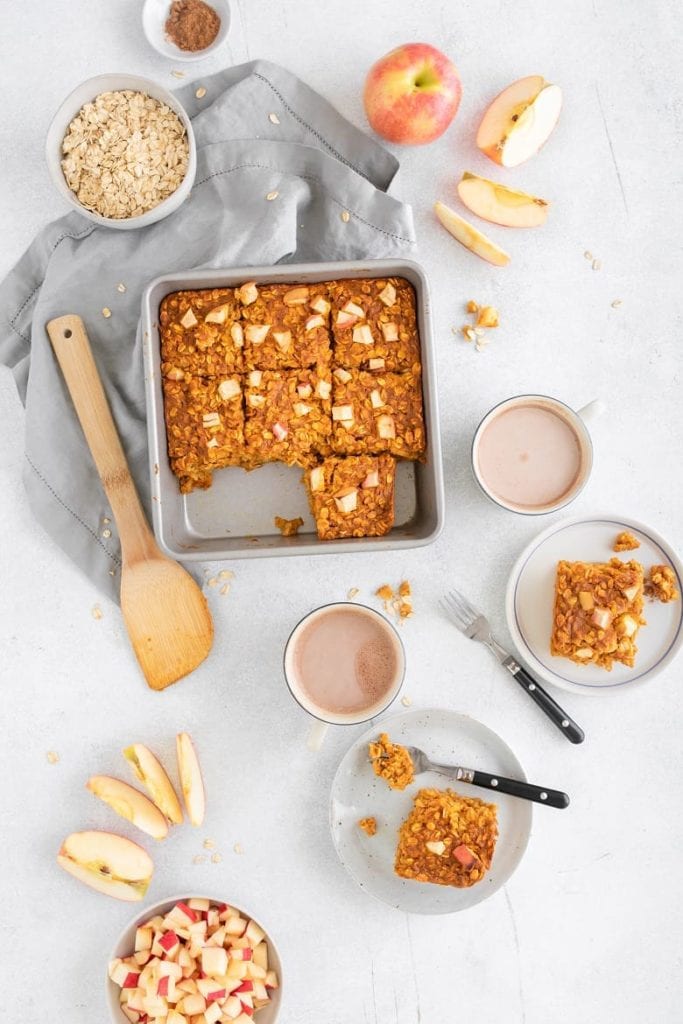


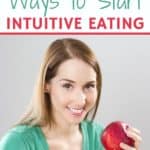
Like This Content?
Support Bucket List TummyThis post is SO helpful, thank you so much. Request for a blog post in the future: importance of sodium and electrolyte balance. I had a health scare yesterday thanks to me being stupid for listening to triggering information in the media about reducing sodium, and my levels are way too low (especially for my high activity level and how much water I drink). I need to stop fearing sodium/salt – I was taking in 650mg a day (not a typo – just 650mg). My doctor reminded me of the dangers of this, and reminded me I had no reason to reduce sodium in the first place; so this blog post request is a selfish one, but there it is 🙂
That is scary! How much training are you doing?
I train daily. The good news is that I’ve already taken proactive steps to healthfully increase my sodium intake and be careful not to over hydrate 🙂
It’s so true that it takes feeling your hunger and feeling what satisfaction looks like for you or me on a daily basis; and that can change. There can be different foods that make me satisfied from day to day, and I’m learning that it’s ok! I love your reminder to be spontaneous too; that’s still somewhat difficult for me, but I’m thankful for more victories in that area the past few months!
Each day is totally different – you are so right. I’m glad you are appreciating your little victories, Emily. They really are victories!
Thank you – these are perfect tips and reminders. I think being spontaneous has been the most powerful – or perhaps just my favorite – part of my intuitive eating journey. Not being trapped down by always have your “plan,” and instead one day just throwing that plan to the wind and taking yourself out instead… and ordering simply what sounds really really good… these moments, although still rare, have been the most freeing. They feel so wonderful.
It’s my favorite part too 😉 I find that it really takes any stress and pressure off and really allows a person to “live in the moment.”
Intuitive eating is definitely something that takes practice so these tips are great to start. These will definitely get incorporated into my routine.
Hope you find them helpful!
These are awesome tips for getting started. I think trusting yourself can be really hard sometimes. Thanks for sharing.
It can absolutely be the hardest place to start, especially when everything is so new.